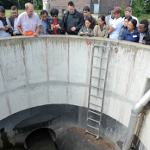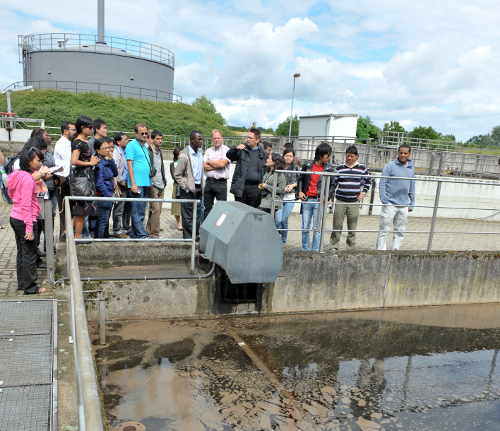Sanitation facilities or sewage treatment plants – a question also covered in Suderburg
 Water is used, made dirty and carried away. In many countries, the precious resource becomes irretrievably lost. One of the issues in Suderburg was the question of how to make more efficient use of water. The participants of a special workshop on waste water looked at sanitation facilities for arid regions. Participants also visited the sewage treatment plant in the city of Uelzen.
Water is used, made dirty and carried away. In many countries, the precious resource becomes irretrievably lost. One of the issues in Suderburg was the question of how to make more efficient use of water. The participants of a special workshop on waste water looked at sanitation facilities for arid regions. Participants also visited the sewage treatment plant in the city of Uelzen.
Latrines, septic tanks, dry toilets or WCs – many ways have been developed to deal with human waste. In Jordan the use of flush toilets is not feasible due to the shortage of water.
It was a gamble to offer up concepts for sanitation plants as a topic of discussion. At first glance, most of the participants’ home countries are more concerned with the water supply, not water disposal. “We were afraid that nobody would be interested in talking about waste water systems,” explains Barbara Kölsch, who helped organise the workshop held at the Suderburg Campus of the Ostfalia University of Applied Sciences. The geographer from Germany is enrolled in the Masters programme “Climate Change and Water Management” (KLIWAWI). Contrary to expectations, the workshop was quite popular.
New approaches in Jordan
“In Jordan we’re working on a sanitation technology we call ‘tap to tap and toilet to toilet’,” explains Mohammad Abdallah. He is currently preparing for his Masters in Environmental Technologies at the Hamburg University of Technology (TUHH). Since Jordan already has a sewage treatment system in place, the future focus is on replacing household toilets with more water-efficient versions. Urine and faecal matter are carried away in two separate pipes. The urine is mixed with a small amount of water and is used to flush the toilet. This saves water. “There’s no such thing as the best system,” says Barbara Kölsch, summing up the workshop. “The decision to go with one or the other system is closely tied to the sophistication of a country’s infrastructure.”
Back to nature
Diversion or dry toilets are the newest ideas under consideration. Urine and faecal matter are not treated as waste but as valuable resources. The nutrients they hold can be used as fertilizer and are recycled back into the environment, closing the loop. “Ecosan” is an ecologically sustainable sanitation solution. “This approach not only includes diversion toilets but constructed wetlands or sewage treatment plants that produce energy,” explains Kölsch.
The field trip to Uelzen was the highlight and a very valuable experience for all. This came as no surprise for Professor Klaus Röttcher, who supervised the students from the KLIWAWI programme in putting together the Suderburg workshop. “Many of the students were amazed at how clean the water is at the end!”






